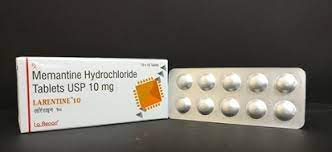Mentatime 10mg Tablet 10s MEMANTINE
Introduction to Mentatime 10mg Tablet 10s
Mentatime 10mg Tablet 10s is a medication primarily used to treat moderate to severe Alzheimer's disease. This condition affects the brain, leading to issues with memory, thinking, and behavior. Mentatime helps alleviate symptoms such as confusion and memory loss, making daily activities easier for those affected.
Composition of Mentatime 10mg Tablet 10s
The active ingredient in Mentatime 10mg Tablet is Memantine. Memantine works by targeting specific brain receptors to improve memory and cognitive function.
Uses of Mentatime 10mg Tablet 10s
- Treats moderate to severe Alzheimer's disease
- Reduces symptoms like confusion and memory loss
- Improves cognitive abilities and daily functioning
Side effects of Mentatime 10mg Tablet 10s
Common side effects:
- Headache
- Diarrhea
- Dizziness
- Confusion
- Constipation
Serious side effects:
- Hallucinations
- Suicidal thoughts
- Insomnia
- Excessive sleepiness (somnolence)
Precautions of Mentatime 10mg Tablet 10s
Do not take Mentatime if you are allergic to any of its ingredients. Inform your doctor about all medications you are taking to avoid potential interactions, especially those affecting the brain or kidneys. The safety of Mentatime during pregnancy and breastfeeding is not well-established, so consult your doctor before use.
How to Take Mentatime 10mg Tablet 10s
- Start with a low dose of 7mg and gradually increase weekly
- Maximum recommended dose is 28mg per day
- Take the medication orally once a day
Conclusion of Mentatime 10mg Tablet 10s
Mentatime 10mg Tablet 10s is an effective treatment for managing symptoms of moderate to severe Alzheimer's disease. By improving memory and cognitive function, it helps enhance the quality of life for those affected. Always follow your doctor's instructions and report any side effects or concerns promptly.


Can I take Mentatime tablet with other prescription drugs?
Mentatime tablet can interact with other medications, increasing the risk of side effects or reducing effectiveness. Drugs that affect the kidneys, such as diuretics, may alter Mentatime tablet levels. Combining Mentatime tablet with other NMDA antagonists can increase side effects like dizziness or confusion. Always inform your doctor about all medications you take to prevent interactions and ensure safe treatment.

Can Mentatime tablet be taken safely while breastfeeding?
The safety of Mentatime tablet while breastfeeding is not well-established. It's unclear if the medication passes into breast milk. If you're breastfeeding or planning to breastfeed, talk with your doctor about the safest options for you and your baby. They can help determine the best treatment plan while considering potential risks and benefits.

Can Mentatime tablet be taken safely while pregnant?
The safety of Mentatime tablet during pregnancy is not well-established. Limited data is available, so it's important to weigh the benefits and risks with your doctor. If you're pregnant or planning to become pregnant, discuss the safest treatment options for your condition. Your doctor can help create a plan that protects both you and your baby.

Does Mentatime tablet affect appetite?
Mentatime tablet doesn't typically affect appetite. Most people taking this medication don't notice changes in how hungry they feel. If you notice unexpected changes in your appetite after starting Mentatime tablet, talk with your doctor. For mild appetite changes, try maintaining regular meal times and eating a balanced diet. Your doctor can help determine if any appetite changes are related to Mentatime tablet or another cause.

Does Mentatime tablet affect mood?
Mentatime tablet doesn't typically cause mood changes. Most people take this medication without experiencing anxiety or agitation. If you notice changes in your mood after starting Mentatime tablet, talk with your doctor. These symptoms might be related to another cause, such as stress or an underlying health condition. Your doctor can help determine the cause and suggest appropriate support.

Does Mentatime tablet affect sleep?
Mentatime tablet doesn't typically cause sleep problems. Most people take this medication without experiencing changes in their sleep patterns. If you notice changes in how well you sleep after starting Mentatime tablet, talk with your doctor. Sleep problems might be related to another cause, such as stress or an underlying health condition. Your doctor can help figure out the cause and suggest ways to improve your rest.

Does Mentatime tablet cause headaches?
Headaches can occur with Mentatime tablet, but they are not common. Most people take this medication without experiencing headaches. If you do get mild headaches, staying hydrated and resting may help. Over-the-counter pain relievers can also be used after consulting your doctor. If headaches are severe or persistent, talk with your healthcare provider to determine if they are related to Mentatime tablet or another cause.

Does Mentatime tablet cause stomach upset?
Mentatime tablet can cause stomach upset, but it's not common. Some people may experience nausea or constipation. These side effects are usually mild and may go away on their own. Taking Mentatime tablet with food might help reduce discomfort. If you have severe or persistent stomach issues, talk with your doctor. They can help determine if these symptoms are related to Mentatime tablet or another cause.

Does Mentatime tablet cause weight gain?
Mentatime tablet doesn't typically affect body weight. Most people taking this medication do not experience significant weight changes. If you notice unexpected weight loss or gain, talk with your doctor. They can help determine if these changes are related to Mentatime tablet or another cause. Maintaining a balanced diet and regular exercise can support overall health while taking this medication.

Does Mentatime tablet have adverse effects?
Adverse effects are unwanted reactions to a medication. Common adverse effects of Mentatime tablet include dizziness, headache, and constipation. These effects are usually mild and temporary. Serious side effects are rare but can include severe allergic reactions or changes in mood. If you experience any new or worsening symptoms, contact your doctor. They can help determine if these symptoms are related to Mentatime tablet and suggest appropriate actions.

Does Mentatime tablet have any safety warnings?
Mentatime tablet has safety warnings you should be aware of. It may cause dizziness or confusion, affecting your ability to drive or operate machinery. If you experience these symptoms, avoid such activities. Mentatime tablet can also interact with other medications, so inform your doctor about all drugs you take. Not adhering to these warnings can lead to increased side effects or reduced effectiveness of the medication.

Does Mentatime tablet interfere with sexual function?
Mentatime tablet doesn't typically interfere with sexual function. Most people taking this medication do not experience changes in sexual desire or performance. However, if you notice any changes in your sexual health while taking Mentatime tablet, it's important to talk with your doctor. They can help determine if these changes are related to the medication or if there might be another cause. Your doctor can also suggest ways to manage any issues you experience while continuing your treatment.

Does Mentatime tablet limit driving?
Mentatime tablet can cause dizziness or confusion, which may impair your ability to drive safely. If you experience these symptoms, avoid driving until you understand how the medication affects you. When you first start Mentatime tablet, pay attention to how your body responds before getting behind the wheel. Talk with your doctor about any concerns you have about driving while taking this medication.

Does Mentatime tablet make it hard to think or concentrate?
Mentatime tablet doesn't typically cause thinking problems or concentration difficulties. Most people take this medication without experiencing changes in mental focus or memory. If you notice problems with your thinking after starting Mentatime tablet, talk with your doctor. These symptoms might be related to another cause, such as an underlying health condition. Your doctor can help determine the cause and suggest solutions.

Does Mentatime tablet make people tired or drowsy?
Mentatime tablet can cause tiredness or drowsiness, but it's not common. Most people take this medication without feeling unusually tired. If you notice you're feeling very sleepy or fatigued while taking Mentatime tablet, talk with your doctor. Your tiredness might be caused by another medication or an underlying health condition. Your doctor can help determine the cause and recommend adjustments to your treatment plan.

For how long do I take Mentatime tablet?
Mentatime tablet is usually a long-term medication for managing Alzheimer's disease. You'll typically take it every day as a lifelong treatment unless your doctor suggests otherwise. Stopping this medication without medical advice could cause your condition to worsen. How long you'll need this medication depends on your body's response and any side effects you experience. Always talk with your doctor before changing or stopping your Mentatime tablet treatment.

How does Mentatime tablet work?
Mentatime tablet works by blocking NMDA receptors in the brain, which are involved in memory and learning. Normally, these receptors help transmit signals, but in Alzheimer's disease, they can become overactive, leading to brain cell damage. Mentatime tablet helps regulate this activity, protecting brain cells and improving cognitive function. Think of it like adjusting the volume on a radio to prevent distortion. This helps manage symptoms of Alzheimer's disease.

How do I dispose of Mentatime tablet?
Dispose of unused Mentatime tablet by taking it to a drug take-back program or collection site at a pharmacy or hospital. If you can't find a take-back program, you can throw it in the trash at home. First, mix it with something undesirable like used coffee grounds, seal it in a plastic bag, and throw it away. This helps prevent harm to people and the environment.

How do I know if Mentatime tablet is working?
Mentatime tablet is used to treat moderate to severe Alzheimer's disease. You'll know it's working if you notice improvements in memory, thinking, or daily activities. Regular check-ups with your doctor are important to monitor your progress. They may use cognitive tests to assess the medication's effectiveness and adjust your treatment as needed.

How do I take Mentatime tablet?
Take Mentatime tablet exactly as your doctor prescribes. It's usually taken once or twice daily, with or without food. Swallow the tablet whole; do not crush or chew it. If you miss a dose, take it as soon as you remember, unless it's almost time for your next dose. In that case, skip the missed dose and continue your regular schedule. Do not take two doses at once. Always follow your doctor's specific instructions regarding food, beverages, and missed doses.

How long does it take for Mentatime tablet to start working?
Mentatime tablet starts working in your body shortly after you take it, but you may not notice all the benefits right away. It can take several weeks to see significant improvements in memory and daily activities. How quickly the medication works can depend on individual factors like age and overall health. Take it exactly as prescribed for the best results.

How should I store Mentatime tablet?
Store Mentatime tablet at room temperature, away from moisture and light. Keep it in a tightly closed container to protect it from damage. Avoid storing it in humid places like bathrooms, where moisture can affect its effectiveness. Always store Mentatime tablet out of children's reach to prevent accidental swallowing. Check the expiration date regularly and properly dispose of any unused or expired medication.

Is it safe to drink alcohol while taking Mentatime tablet?
It's best to avoid alcohol while taking Mentatime tablet. Alcohol can increase side effects like dizziness or confusion, which may affect your safety. If you choose to drink occasionally, limit your alcohol intake and watch for warning signs like increased dizziness or confusion. Talk with your doctor about alcohol use while taking Mentatime tablet for personalized advice.

Is it safe to drink coffee or tea while taking Mentatime tablet?
You can drink coffee and tea while taking Mentatime tablet. There's no known interaction between caffeine and Mentatime tablet. However, caffeine can cause increased urination and may affect sleep. Enjoy caffeinated drinks in moderation and ensure you drink plenty of water throughout the day. If you notice any unusual symptoms, talk with your doctor.

Is it safe to exercise while taking Mentatime tablet?
You can exercise while taking Mentatime tablet, but be cautious. Mentatime tablet can cause dizziness, which might affect your balance during physical activity. To exercise safely, start with light activities and gradually increase intensity. Stay hydrated and watch for signs of dizziness or fatigue. If you notice these symptoms, slow down or stop exercising and rest. Consult your doctor if you have concerns.

Is it safe to stop Mentatime tablet?
Mentatime tablet is usually used for long-term treatment of chronic conditions like Alzheimer's disease. Stopping it suddenly may lead to a return of symptoms. There are no known withdrawal symptoms, but always talk with your doctor before stopping Mentatime tablet. They may suggest gradually reducing your dose to prevent any potential issues and ensure your condition remains stable.

Is Mentatime tablet addictive?
Mentatime tablet is not considered addictive or habit-forming. It does not cause dependency or withdrawal symptoms when you stop taking it. Mentatime tablet works by affecting brain chemicals involved in memory and learning, but it doesn't alter brain chemistry in a way that leads to addiction. If you have concerns about medication dependence, you can feel confident that Mentatime tablet doesn't carry this risk.

Is Mentatime tablet effective?
Mentatime tablet is effective in treating moderate to severe Alzheimer's disease. It works by regulating glutamate, a brain chemical involved in memory and learning. Clinical studies show that Mentatime tablet can improve cognitive function and daily living activities in people with Alzheimer's. It may not cure the disease but can help manage symptoms and improve quality of life. Always follow your doctor's advice for the best results.

Is Mentatime tablet safe for the elderly?
Elderly individuals are more vulnerable to medication side effects due to age-related changes in the body. Mentatime tablet is generally safe for the elderly, but they may experience dizziness or confusion more frequently. Regular monitoring by a healthcare provider is important to ensure safety and effectiveness. Always follow your doctor's advice and report any new or worsening symptoms.

What are Mentatime tablet possible harms and risks?
Mentatime tablet hydrochloride extended-release capsules can cause side effects. The most common side effects are headache, diarrhea, and dizziness. Other common side effects include confusion and constipation. In studies, the chance of stopping treatment due to side effects was the same for people taking Mentatime tablet as for those taking a placebo (a pill with no medicine). No single side effect was reported by more than 1% of people taking Mentatime tablet and at a higher rate than those taking a placebo.

What are the most common side effects of Mentatime tablet?
Side effects are unwanted reactions to a medication. Common side effects of Mentatime tablet include dizziness, headache, and constipation. These occur in a small percentage of people and are usually mild. If you notice new symptoms after starting Mentatime tablet, they might be temporary or unrelated to the medication. Talk with your doctor before stopping any medication.

What disease or symptom is Mentatime tablet used for?
Mentatime tablet is primarily used to treat moderate to severe Alzheimer's disease. It helps improve memory, thinking, and daily activities by regulating brain chemicals involved in these functions. Mentatime tablet is often used in combination with other Alzheimer's medications to enhance its effectiveness. It may not cure the disease but can help manage symptoms and improve quality of life for those affected.

What is Mentatime tablet?
Mentatime tablet is a medication used to treat moderate to severe Alzheimer's disease. It belongs to a class of drugs called NMDA receptor antagonists, which work by regulating glutamate, a brain chemical involved in memory and learning. Mentatime tablet helps improve cognitive function and daily living activities in people with Alzheimer's. It may not cure the disease but can help manage symptoms and improve quality of life.

What is the usual dose of Mentatime tablet?
The usual starting dose of Mentatime tablet for adults is 5 mg once daily. Your doctor may gradually increase the dose to 10 mg twice daily, depending on your response and tolerance. The maximum recommended dose is 20 mg per day. Dose adjustments may be necessary for elderly patients or those with kidney problems. Always follow your doctor's specific dosing instructions for your health needs.

Who should avoid taking Mentatime tablet?
Do not take Mentatime tablet if you're allergic to it or its ingredients. Serious allergic reactions require immediate medical help. Caution is needed for people with severe kidney problems, as Mentatime tablet may not work well and could worsen kidney function. Always consult your doctor about any concerns or conditions that might affect your use of Mentatime tablet.















.svg)
